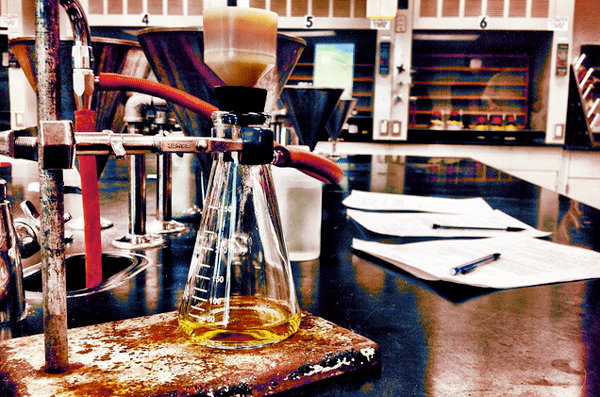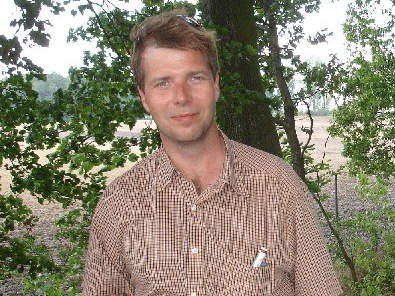The Chemical Internet
Air Date: Week of August 24, 2012

Chemistry the old-fashioned way; the new chemical web could streamline processes. (Photo: Flickr CC/Justin Cooper)
The invention of the Internet revolutionized the world. Now, a new type of network -- a chemical internet -- could fundamentally transform the chemical world we live in. Host Steve Curwood talks with Bartosz Grzybowski, professor of chemistry at Northwestern University in Evanston, Illinois, who created a chemical internet called Chematica which he believes could change how drugs are made.
Transcript
CURWOOD: The Internet has fundamentally changed our world. Now, the creation of another kind of internet--a chemical internet--also has revolutionary potential, not only for the field of chemistry, but for the environmental impact of the chemically-laden world we now live in. Bartosz Grzybowski is a professor of chemistry at Northwestern University in Evanston, Illinois.
Professor Grzybowski and his team have developed software that can track the almost infinite number of possible chemical reactions to find the quickest, cheapest and most environmental safe ways to make things. They nicknamed this software the "chemical internet."

Bartosz A. Grzybowski - K. Burgess Professor of Physical Chemistry and Chemical Systems Engineering, Director of the DoE Non-equilibrium Research Center
GRZYBOWSKI: Imagine a huge network, but instead of computers connected by nodes, we have molecules connected by reactions. And this information has been created not by me, not by my colleagues, but by every chemist that ever lived. So it's a huge mass of chemical reactions connecting molecules existing individually.
What we have done, we collected all this information and hooked it up into a network. Think about it this way: what Google did for the internet--searching for names, addresses, companies, and all that--now we, by having created this chemical internet, what we're doing is a sort of a chemical Google that allows a very different way of looking at chemistry, analyzing chemistry, finding optimal synthetic pathways, new ways of making drugs.
So it's a global view on chemistry, and it's based not on the knowledge of a single chemist--not on my expertise, not on the expertise of any of my colleagues, but on the expertise of every chemist who ever lived.
CURWOOD: As I understand it, there are some seven million different substances that you have linked by knowledge, the reactions that get you from one to another, what do you do with all of that?
GRZYBOWSKI: So let me give you one example. The classical activity of a chemist is to design a synthetic pathway that leads to a molecule like a drug. Now the way it's typically done is you take this complex molecule that you wish to make, you go one synthetic step back, and then you, let's say, have a smaller precursor and then you think, 'Oh, what I do is this molecule,' and you go sort of one step, one step, one step backwards until you reach molecules that you can buy from which you can start your synthesis.
Now, the problem is that if you can imagine a huge highly connected network, one step away you have, let's say, one hundred possibilities because all these molecules have many multiple ways of making them. Two steps away, you'll have something like ten to the third. Three steps away you'll have something like ten to the sixth. By the time you reach six, seven steps, we're talking on the order of possible ways of making this drug approaching much higher than the U.S. debt, and approaching the age of the universe. So let's say something on the order of ten to the twentieth.
Now, out of these ten to the twentieth pathways, the chemist will always strive to find the most optimal one, the most economical one. But the chance of doing this just by human expertise is virtually nil. You simply cannot memorize, you simply cannot consider that many routes leading to this drug molecule. Fortunately, computers and graph theory tools have become powerful enough that you can script this to explore all the possible pathways and choose the one that is really the optimal one.
So all together, what we're doing with this, we're finding pathways that no human, just by the limitations of our brain, no human will ever be able to explore and consider.
CURWOOD: So tell me about the potential that your chemical internet has for what we call green chemistry these days?
GRZYBOWSKI: Aha! And this is very frustrating. When you do it as a chemist, imagine you go this one step back, one step back, one step back, and five steps, after two weeks of hard labor, going to the library, checking the sources and all that, you discover that one of your starting materials is regulated by the EPA. Not good, because then you have to start from scratch.
So, now, the computer, the algorithms I told you about, the ways of finding optimal synthetic pathways, it's just a quicker way to specify, 'I don't want to use this molecule because it kills the fish, this molecule because it goes into the soil, this molecule because something else, and please find me the optimal synthetic pathway without using molecules that are dangerous to the environment.'
CURWOOD: And what about downstream? In other words, if a chemical gets put together, what can your chemical internet tell us about what effects it might have after it's been made and dispersed in the environment?
GRZYBOWSKI: This is something that goes into what we call machine learning. So think about this way: how do we learn about a chemical being toxic or being reactive towards something else? Well, we learn by example and by similarity of one compound to the other.

Chemistry the old-fashioned way; the new chemical web could streamline processes. (Photo: Flickr CC/Justin Cooper)
What we can do, having all the collective knowledge ever created in chemistry, we can train the computer to extract certain patterns automatically, and these patterns are then based not on our individual experience, but on the experiences of everything that was used to train the computer, meaning every single reaction ever performed. So it is quite powerful, and it's very, very predictive.
CURWOOD: Who gets access to your algorithms? Who has access now to the chemical internet?
GRZYBOWSKI: Now, of course, it took about a decade and lots of money and lots of investment and all that stuff, so when we deal with companies, this is not for free. We sell the software. But we're keeping a healthy balance, I hope, between being commercial in our business relations, and giving at least some modules of it to students who can use it and learn it.
CURWOOD: What about a terrorist who wants to figure out a way to make a bomb from completely innocuous materials that would be very easy to move around or purchase?
GRZYBOWSKI: Oh yes, and now you're bringing up one customer that I wanted to avoid, but one of our customers is the U.S. government. Well, in this entire network of chemical compounds, some of them are nerve gases, like VX, some of them are chemical weapons of sorts. And if this technology gets into the hands of the bad guys, they could use it to optimize the synthesis of their chemical weapons, right?
So we reversed the problem, and we started asking the question: Look, if somebody wishes to make a chemical weapon in a way that would not be detected by the government, what would be the optimal strategy to evade the existing regulatory strategy by the government? And initially our hope was that it would not be possible because, of course, the U.S. government is monitoring everything in gory detail.
You can imagine that by searching this huge network, we found so many loopholes that it became scary. So then we went to the Pentagon, and they were genuinely moved by and concerned by what they saw. So we are now developing this software and this is one of the customers that we'll just give the software to and they'll be able to monitor the production, the synthetic pathways leading to chemical weapons in a much better, much more secure way.
CURWOOD: The invention of the internet--the digital internet--radically changed our lives. How might the world look different now with this chemical internet?
GRZYBOWSKI: Well, imagine that we don't have to use toxic chemicals, that we can do things instead of doing five reactions, we can do just one reaction at a fraction of the cost, we can synthesize drugs a more efficient, faster way. So it's a global view on chemistry, it's going to streamline and optimize the discipline. It's going to be a very, very useful tool.
CURWOOD: Bartosz Grzybowski is professor of chemistry at Northwestern University in Evanston, Illinois and calls his chemical internet, Chematica. Thank you so much for taking this time with us today.
GRZYBOWSKI: Thank you.
Links
Living on Earth wants to hear from you!
Living on Earth
62 Calef Highway, Suite 212
Lee, NH 03861
Telephone: 617-287-4121
E-mail: comments@loe.org
Newsletter [Click here]
Donate to Living on Earth!
Living on Earth is an independent media program and relies entirely on contributions from listeners and institutions supporting public service. Please donate now to preserve an independent environmental voice.
NewsletterLiving on Earth offers a weekly delivery of the show's rundown to your mailbox. Sign up for our newsletter today!
 Sailors For The Sea: Be the change you want to sea.
Sailors For The Sea: Be the change you want to sea.
 The Grantham Foundation for the Protection of the Environment: Committed to protecting and improving the health of the global environment.
The Grantham Foundation for the Protection of the Environment: Committed to protecting and improving the health of the global environment.
 Contribute to Living on Earth and receive, as our gift to you, an archival print of one of Mark Seth Lender's extraordinary wildlife photographs. Follow the link to see Mark's current collection of photographs.
Contribute to Living on Earth and receive, as our gift to you, an archival print of one of Mark Seth Lender's extraordinary wildlife photographs. Follow the link to see Mark's current collection of photographs.
 Buy a signed copy of Mark Seth Lender's book Smeagull the Seagull & support Living on Earth
Buy a signed copy of Mark Seth Lender's book Smeagull the Seagull & support Living on Earth

